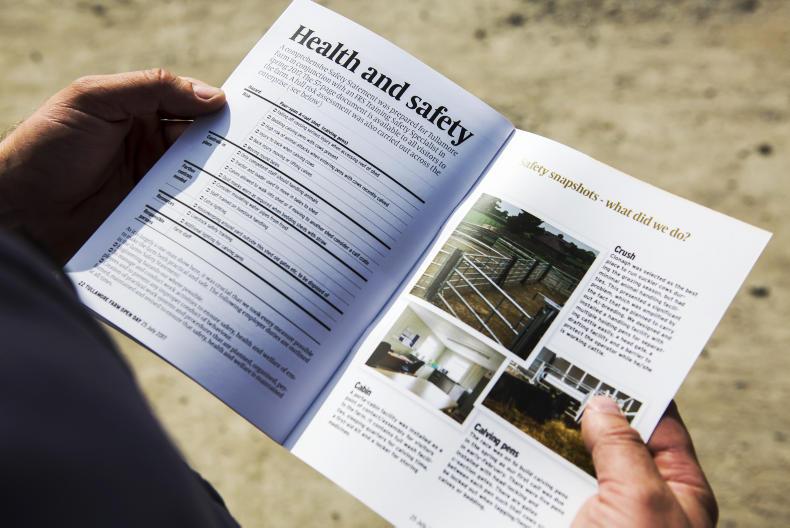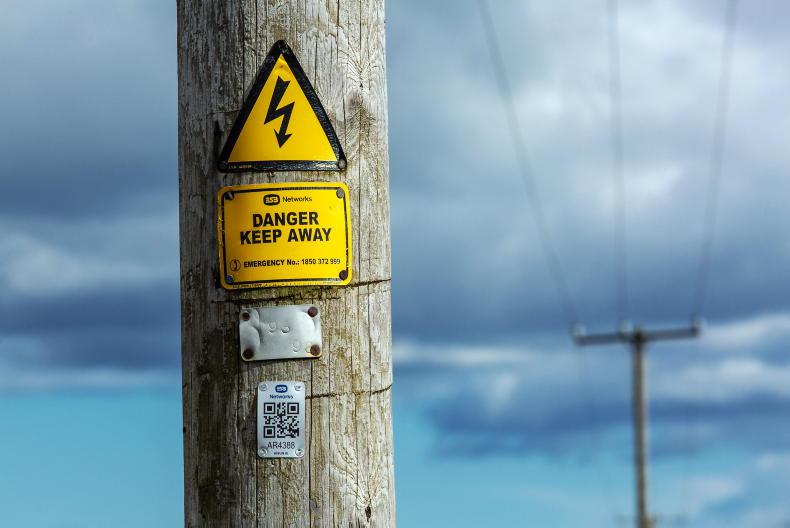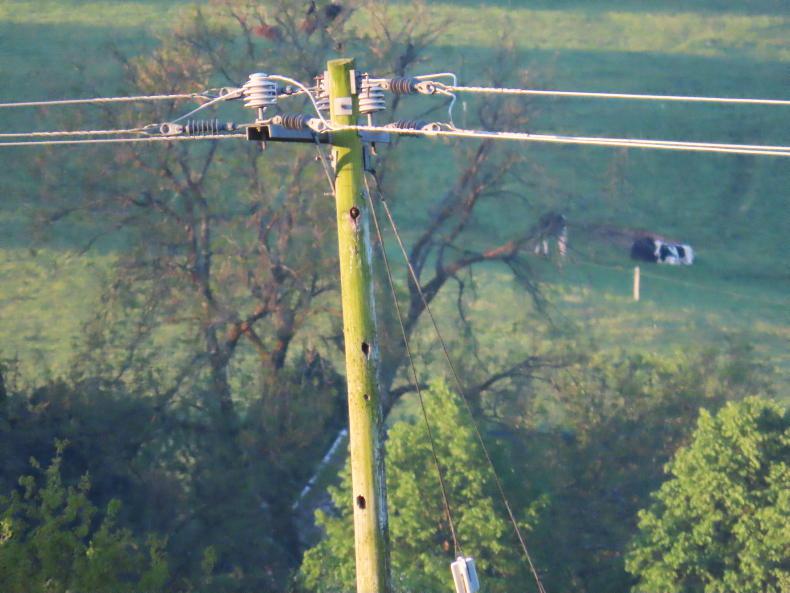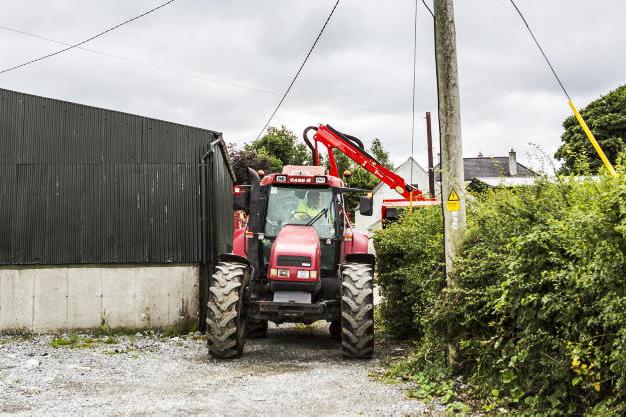Pat Griffin is the senior inspector with the Health and Safety Authority (HSA). He has seen it all when it comes to farm-related accidents. Pat shared some very good advice with the Irish Farmers Journal based on his experiences in the HSA.
Pat believes that with some small changes to the everyday routine, farmers can make a big difference where safety is concerned. “When it comes to farm-related accidents, we always hear about the dreadful fatalities in the press. What we don’t hear about is the 3,000 non-fatal accidents that happen on farms annually,” Pat said. “These accidents are non-fatal but they can be very serious and often life-changing both for the individual and the extended family. Sadly, there are farmers confined to wheelchairs for life or who have suffered loss of limbs, due to these life changing accidents.”
Pat added that other serious accidents have seen farmers unable to work for up to 100 days and the cost implications are huge. He believes one of the main causes of many of these accidents is simply from rushing around because adequate time is not given to planning out the working day.
Advice
Pat says 2019 should be the year that the circumstances which often lead to these serious accidents are changed for good.
“This is where planning comes in. Consider the coming day’s work, preferably the night before or at least early in the morning. Identify the critical work that must to be done. Don’t put this critical necessary work on the long finger.
"You don’t want to be in a situation where you are running around at the end of the day trying to complete it,” he said.
“Also, during this planning you should identify work where you may need an extra pair of hands to help out. It might be a case of asking a neighbour or someone competent to help for the two-person task,” said Pat.
“If you are struggling long-term to get all the work done in the day maybe it’s time to look at getting more regular labour for the farm, even if it’s on a part-time basis.”
Pat said another area that is often forgotten but is critically important for a farmer’s well-being is “investing in yourself”.
He said this is important because you are the most important asset to the farm.
Many farmers have in recent years invested significantly in the farm whether it’s in tractors, machinery, buildings or livestock, but fail to invest anything in themselves.
“Too many farmers have threadbare boots and loose, often torn clothing with a general reluctance to buy better gear. Small investment in good clothing is not just for comfort – it could save your life,” Pat said.
“Every farmer should have boots and wellingtons with good grips and steels toecaps and soles. Loose clothing is not suitable for a farm because you will be far more prone to getting caught in moving machinery,” he said.
He said next year should be the year farmers look after their general health too.
“Is there any opportunity to get involved in something outside farming? Could you do a computer course, go swimming, play cards, anything to get away from the farm for a couple of hours,” he said.
This will help you to recharge and unwind from the stress of the farm for a few hours every week and may give you a different perspective when you return.
Code of practice
According to Pat, a review of the code of practice must be done in 2019.
“Why not review your risk assessment early in 2019 before the farm gets really busy,” he suggested.
“Maybe if there are young people working on the farm they could be involved in this review.”
Machinery is one area that needs particular attention when carrying out this review.
“Tractors are the biggest killer, with 64 people killed as a direct consequence of a tractor or other vehicles such as quads and teleporters in the last 10 years, so these really need your full attention,” said Pat.
“In a lot of cases the tractor rolls from its parked position and traps the operator or passer-by,” he said.
The whole mindset around tractors needs to change, according to Pat.
He believes essential checks need to be carried out daily – fuel level, mirrors, brakes, lights, windows, cab floor, etc.
By doing these checks before you take off, you can avoid delays further down the road if something goes wrong. By being organised you are less likely to be rushing which has a direct correlation with a possible accident.
Pat also suggested that farmers should install a hands-free kit in their tractor so they do not have to hold the phone to their ear.
He said it makes tractor operation much safer. At the end of the working day, the tractor should be reverse-parked into its parking spot, avoiding slopes.
The idea here is when visibility is poor in the morning you will have a much clearer view driving forward rather than reversing out of the parking position.
Clearly, if someone follows you out to tell you something it will be far safer if you are not reversing the tractor with half-misted windows.
He also suggests if the parking break or service break is poor they must be fixed as soon as possible and wheels chocked in the short term until they are fixed properly.
When it comes to PTOs, Pat threw out an interesting statistic: “Inspections have found that up to 30% of PTOs on farms have defective PTO guarding. With an unguarded or poorly guarded PTO you are running a significant risk of a serious entanglement or loss of life. Where there is a properly fitted complete guard in place the risk is reduced to zer0 – it is one of the only elements in farm safety where our actions can reduce a safety risk to zero,” he pointed out.
Calving facilities also need to be looked at in January, Pat warned.
“Every farmer calving cows need good facilities and if you are feeding or tagging a calf there needs to be a physical barrier between you and the cows,” he concluded.
The latest figures from the National Farm Survey shows a significant jump in non-fatal injuries from dealing with livestock, with being kicked, crushed or butted being the most common source of injury. Farmers should design and lay out their calving and livestock facilities to minimise direct contact with the livestock.
Christmas Safety Tips – Arthur Byrne, public safety Manager with ESB networks
Only use electrical equipment, including Christmas lights that are in good condition.Switch off all electrical appliances, including Christmas lights and phone chargers, last thing at night and when leaving the house.Always unwind extension cords completely to avoid overheating and don’t overload sockets with adaptors or extension blocks.Electricity wires are always live; never approach.If you see fallen wires, keep clear and phone ESB Networks immediately on 1850 372 999/021 238 2410.
Pat Griffin is the senior inspector with the Health and Safety Authority (HSA). He has seen it all when it comes to farm-related accidents. Pat shared some very good advice with the Irish Farmers Journal based on his experiences in the HSA.
Pat believes that with some small changes to the everyday routine, farmers can make a big difference where safety is concerned. “When it comes to farm-related accidents, we always hear about the dreadful fatalities in the press. What we don’t hear about is the 3,000 non-fatal accidents that happen on farms annually,” Pat said. “These accidents are non-fatal but they can be very serious and often life-changing both for the individual and the extended family. Sadly, there are farmers confined to wheelchairs for life or who have suffered loss of limbs, due to these life changing accidents.”
Pat added that other serious accidents have seen farmers unable to work for up to 100 days and the cost implications are huge. He believes one of the main causes of many of these accidents is simply from rushing around because adequate time is not given to planning out the working day.
Advice
Pat says 2019 should be the year that the circumstances which often lead to these serious accidents are changed for good.
“This is where planning comes in. Consider the coming day’s work, preferably the night before or at least early in the morning. Identify the critical work that must to be done. Don’t put this critical necessary work on the long finger.
"You don’t want to be in a situation where you are running around at the end of the day trying to complete it,” he said.
“Also, during this planning you should identify work where you may need an extra pair of hands to help out. It might be a case of asking a neighbour or someone competent to help for the two-person task,” said Pat.
“If you are struggling long-term to get all the work done in the day maybe it’s time to look at getting more regular labour for the farm, even if it’s on a part-time basis.”
Pat said another area that is often forgotten but is critically important for a farmer’s well-being is “investing in yourself”.
He said this is important because you are the most important asset to the farm.
Many farmers have in recent years invested significantly in the farm whether it’s in tractors, machinery, buildings or livestock, but fail to invest anything in themselves.
“Too many farmers have threadbare boots and loose, often torn clothing with a general reluctance to buy better gear. Small investment in good clothing is not just for comfort – it could save your life,” Pat said.
“Every farmer should have boots and wellingtons with good grips and steels toecaps and soles. Loose clothing is not suitable for a farm because you will be far more prone to getting caught in moving machinery,” he said.
He said next year should be the year farmers look after their general health too.
“Is there any opportunity to get involved in something outside farming? Could you do a computer course, go swimming, play cards, anything to get away from the farm for a couple of hours,” he said.
This will help you to recharge and unwind from the stress of the farm for a few hours every week and may give you a different perspective when you return.
Code of practice
According to Pat, a review of the code of practice must be done in 2019.
“Why not review your risk assessment early in 2019 before the farm gets really busy,” he suggested.
“Maybe if there are young people working on the farm they could be involved in this review.”
Machinery is one area that needs particular attention when carrying out this review.
“Tractors are the biggest killer, with 64 people killed as a direct consequence of a tractor or other vehicles such as quads and teleporters in the last 10 years, so these really need your full attention,” said Pat.
“In a lot of cases the tractor rolls from its parked position and traps the operator or passer-by,” he said.
The whole mindset around tractors needs to change, according to Pat.
He believes essential checks need to be carried out daily – fuel level, mirrors, brakes, lights, windows, cab floor, etc.
By doing these checks before you take off, you can avoid delays further down the road if something goes wrong. By being organised you are less likely to be rushing which has a direct correlation with a possible accident.
Pat also suggested that farmers should install a hands-free kit in their tractor so they do not have to hold the phone to their ear.
He said it makes tractor operation much safer. At the end of the working day, the tractor should be reverse-parked into its parking spot, avoiding slopes.
The idea here is when visibility is poor in the morning you will have a much clearer view driving forward rather than reversing out of the parking position.
Clearly, if someone follows you out to tell you something it will be far safer if you are not reversing the tractor with half-misted windows.
He also suggests if the parking break or service break is poor they must be fixed as soon as possible and wheels chocked in the short term until they are fixed properly.
When it comes to PTOs, Pat threw out an interesting statistic: “Inspections have found that up to 30% of PTOs on farms have defective PTO guarding. With an unguarded or poorly guarded PTO you are running a significant risk of a serious entanglement or loss of life. Where there is a properly fitted complete guard in place the risk is reduced to zer0 – it is one of the only elements in farm safety where our actions can reduce a safety risk to zero,” he pointed out.
Calving facilities also need to be looked at in January, Pat warned.
“Every farmer calving cows need good facilities and if you are feeding or tagging a calf there needs to be a physical barrier between you and the cows,” he concluded.
The latest figures from the National Farm Survey shows a significant jump in non-fatal injuries from dealing with livestock, with being kicked, crushed or butted being the most common source of injury. Farmers should design and lay out their calving and livestock facilities to minimise direct contact with the livestock.
Christmas Safety Tips – Arthur Byrne, public safety Manager with ESB networks
Only use electrical equipment, including Christmas lights that are in good condition.Switch off all electrical appliances, including Christmas lights and phone chargers, last thing at night and when leaving the house.Always unwind extension cords completely to avoid overheating and don’t overload sockets with adaptors or extension blocks.Electricity wires are always live; never approach.If you see fallen wires, keep clear and phone ESB Networks immediately on 1850 372 999/021 238 2410. 









SHARING OPTIONS